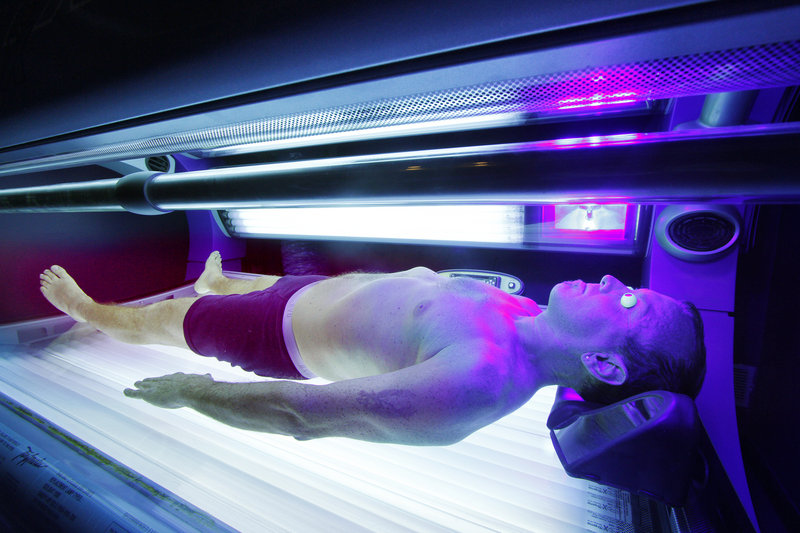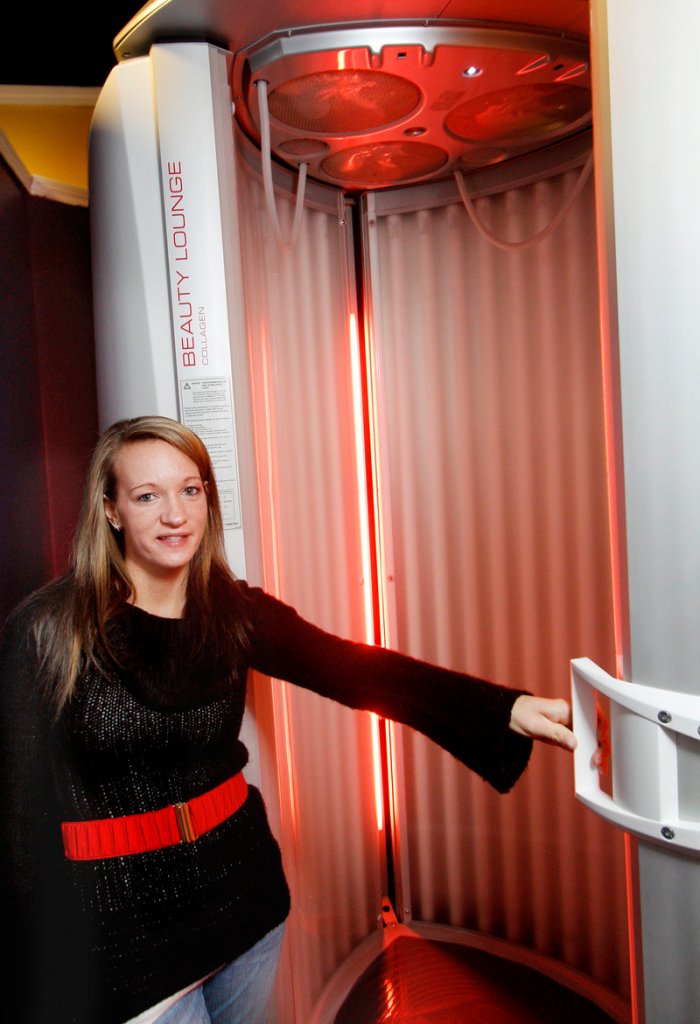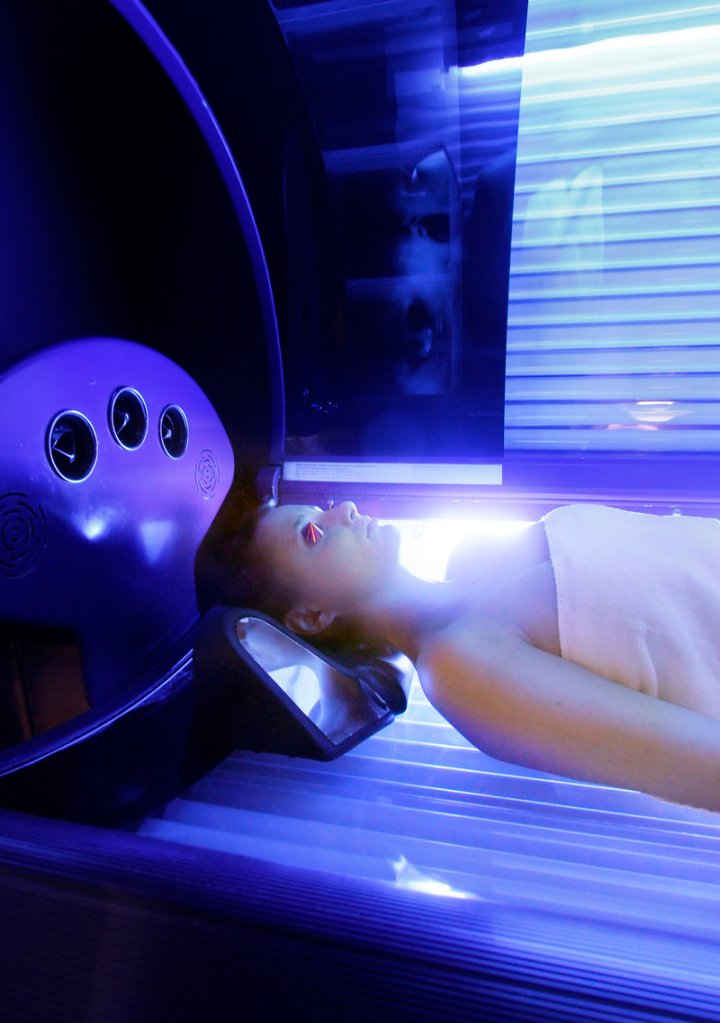With spring vacations and proms approaching, it’s getting to be peak season for indoor tanning.
That’s especially true in the Portland area, which has one of the nation’s highest per-capita concentrations of tanning salons.
But the indoor tanning booth is an indulgence that could soon be off-limits to minors.
The American Academy of Pediatrics said last week that anyone younger than 18 should be banned from tanning salons because of the risk of skin cancer. The U.S. Food and Drug Administration is considering such an age restriction, which has been recommended by the World Health Organization, the American Medical Association and the American Academy of Dermatology.
“The worst cancers that I see and the youngest people that I see with cancers are tanning bed users,” said Dr. Brian O’Donnell, a dermatologist from Freeport who specializes in skin cancer treatment. O’Donnell testified last year as part of a panel recommending more restrictions on tanning salons, including the ban on minors.
“I don’t know of any reason for a person to be in a tanning bed,” he said.
The tanning industry opposes such an age limit, saying that responsible use of tanning booths is safer than outdoor tanning and arguing that parents and teenagers can make their own decisions without government interference.
Mainers clearly like the service. A study published in 2009 in the American Journal of Preventive Medicine said Portland ranked fourth nationwide for the most tanning salons per capita. The study identified 16 salons in the city at the time.
“This is my busy time of year,” said Matt Hondel, co-owner of the Local Acapulco Tanning Studio in South Portland. “I get a lot of people that say they’re feeling the cold winter and they need the sunshine.”
Maine already bans indoor tanning for anyone younger than 14. Fourteen- and 15-year-olds must have a parent present when they tan, and 16- and 17-year-olds need written permission from a parent.
Maine’s age restrictions are intended to protect minors, who tend to make risky decisions about their health. The rules also recognize that the earlier someone starts tanning, the more dangerous it can be, said Stephen Sears, acting director of the Maine Center for Disease Control and Prevention.
“The longer you have exposure, the more opportunity you have to cause damage to your skin,” Sears said. “People have to recognize that’s exposure to radiation. … I think people underestimate the damage that the sun does to their skin.”
Elise Kennaugh, 25, of Portland said she started going to tanning salons, with her mother’s permission, when she was 16. Other girls in her high school tanned, too. It still helps her get through Maine’s long winters, she said.
“It’s kind of like a depressing time of year,” Kennaugh said. “When you’re relaxing and you’re getting color, it’s good for you. … It makes you feel more energized and more positive.”
At the same time, Kennaugh said she limits her tanning time, going about once a month after a few initial visits. “Doing it too much can definitely hurt your skin. … I don’t want to get cancer,” she said.
Hondel said the youngest customers at Local Acapulco are generally 17 or 18, and he discourages tanning for anybody younger than 16. “If you’re 14 years old, you don’t need a tan,” he said.
Some teenage girls come in for pre-prom tans in the spring, he said. But a lot of them are now choosing spray-on tans, which last about 10 days and don’t carry the warnings about skin damage and cancer.
“Right now, spray tanning is huge for … anybody who wants UV-free,” said Hondel, whose salon offers spray-on tans.
Older teenagers and their parents should be able to make their own decisions, Hondel said. “I definitely think it’s the parents’ choice,” he said.
Tanning lamps make the body produce vitamin D the same way sunlight does, and many customers say they feel perked up by the sensation of warm ultraviolet rays at this time of year, Hondel said.
Local Acapulco also offers a red-light therapy booth as an alternative antidote for the winter blues, he said. The booth offers the warmth and light of a tanning booth, but without the UV rays — or the tan.
Cami Hondel, Matt’s wife and co-owner of the salon, said she doesn’t allow anyone to go into a booth or tanning bed long enough to get a sunburn. “That’s what causes cancer, is the burning and healing, burning and healing,” she said.
A history of sunburns does increase the risk of cancer, but any change in skin color due to exposure to UV rays — even a golden tan — is a sign of skin damage, according to the U.S. Centers for Disease Control and Prevention.
The rays do far more harm than good, said O’Donnell, the dermatologist.
“The general public use of tanning beds is, I think, very similar to the use of cigarettes,” he said. “It creates damage to cells that increases the chance of cancer.”
Getting a base tan before a spring vacation doesn’t protect people, “it just creates more damage to the skin,” O’Donnell said. And, he said, a walk in the winter sunshine or dietary supplements are safer ways to boost vitamin D levels.
UV radiation from tanning beds can increase a person’s risk of melanoma, the deadliest form of skin cancer, by 75 percent, O’Donnell said. Melanoma cases have been rising about 3 percent a year in women age 15 to 39.
Recent research has produced evidence that some indoor-tanning customers have physiological signs of addiction to the rays, making it hard for them to stop and raising their risk, O’Donnell said. “The people that we see who have the most problems are the most frequent users,” he said.
O’Donnell said he has treated fatal skin cancers, as well as cases that require surgery to remove damaged skin or even parts of noses, eyelids or lips.
“It’s good for my business, but I hate to see these folks come in with these cancers,” he said. “I would be absolutely fine if (tanning salons) disappeared, but especially I want to protect the young kids.”
Staff Writer John Richardson can be contacted at 791-6324 or at:
jrichardson@pressherald.com
Send questions/comments to the editors.





Success. Please wait for the page to reload. If the page does not reload within 5 seconds, please refresh the page.
Enter your email and password to access comments.
Hi, to comment on stories you must . This profile is in addition to your subscription and website login.
Already have a commenting profile? .
Invalid username/password.
Please check your email to confirm and complete your registration.
Only subscribers are eligible to post comments. Please subscribe or login first for digital access. Here’s why.
Use the form below to reset your password. When you've submitted your account email, we will send an email with a reset code.